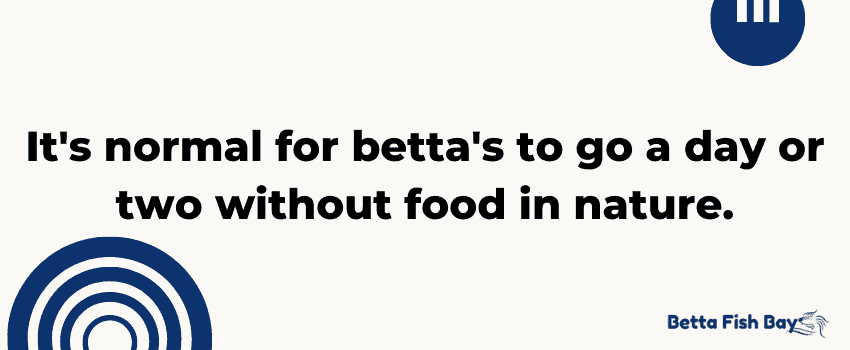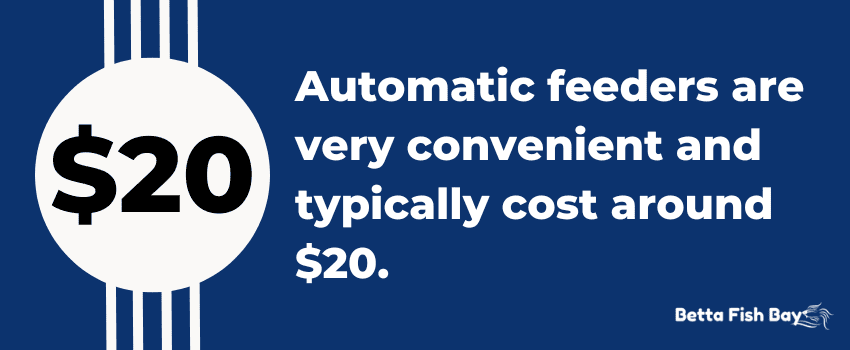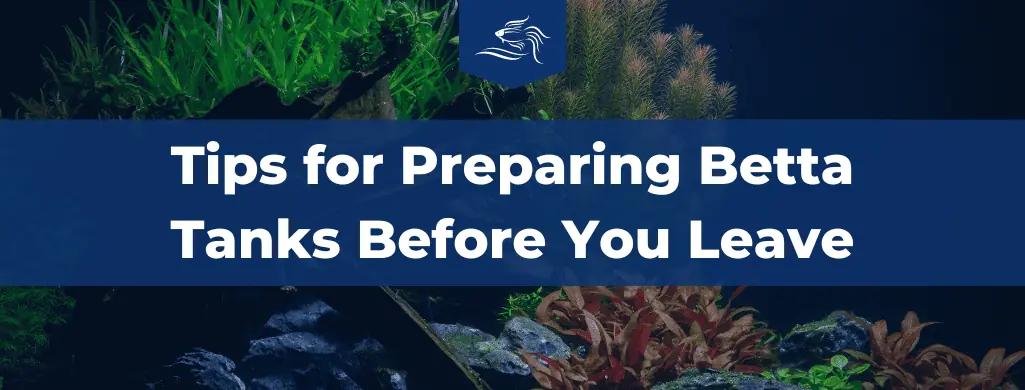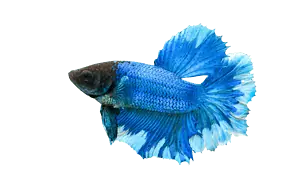Betta fish are one of the few pets we can leave completely alone while on vacation.
But if you don’t have anyone to look in on your fish while you’re gone, you might need to cut your trip short.
Betta fish can go up to two weeks without food in some cases. However, leaving them for more than a week is bad for their health. Your betta enters survival mode if they go too long without food, which can make them sick or vulnerable. Keeping vacations to seven days or less is ideal.

Table of Contents
How Long Will Betta Fish Survive Without Food?
Many betta fish can go 10-14 days without food before getting very sick and dying.
But it’s dangerous to assume your fish could go for such a long time.
Even if they managed to survive for two weeks without food, they would probably face serious consequences.
They become more susceptible to fin rot and other illnesses.
If you have multiple fish in your aquarium, they might resort to eating one another.
See, betta fish are hunters in the wild.
It’s instinctual for them to eat smaller fish, shrimp, or even snails to stay alive.
This being said, it’s also normal for them to go a day or two without food in nature.

Because of this, it’s okay to leave them for a short period.
Again, it’s best not to risk more than two or three days without food.
We do not recommend pushing it for more than four or five days.
What Happens If You Leave Your Betta Too Long Without Food?
After a certain period, your betta will experience health complications.
For one thing, betta fish are susceptible to all kinds of stress-induced diseases.
It is very stressful for them if they go for too many days unfed and don’t have other fish to prey on either.
Furthermore, their bodies lose out on much-needed energy.
Have you ever missed food for most or all of a day?
I can tell you from experience how much it saps your energy.
While fish take longer to feel the same impact, hunger still wreaks havoc on their bodies.
They are not as good at fighting off sicknesses like Swim Bladder Disease or fin rot.
Something else to consider is water changes.
When you’re away and don’t have anyone taking care of your betta, the water is left unchanged.
Because your betta’s body is under stress from those days of fasting, they are more likely to be hurt by poor water conditions.
Waste and ammonia build-up, temperature fluctuations, and even pH changes are a bigger possibility while you’re away.
This means fin-rot, Swim Bladder Disease, and other forms of poor health are also more of an issue.
Options for Feeding Your Betta While Away Or On Vacation
If you’re planning to be gone for more than a weekend, it’s best to figure out a way to keep your betta fed.
Don’t worry if your friends and family cannot fish-sit for you.
There are various ways to keep your betta on a balanced diet while away!
- Ask a friend or family member
- Pay a pet sitter
- Use an automatic feeder
- Use a block feeder
Leaving Your Betta with Friends and Family
Friends and family members are great helpers if you’re only going to be gone for a week or so.
All they need to do is drop in the right number of pellets at feeding time and maybe check the tank’s temperature every day or two.
If it’s easier, ask them to come by every other day.
Your betta will be fine fasting every other day as long as they still get food consistently.
Hiring a Pet Sitter
Depending on your area, it may be difficult to find a good sitter for your fish.
One great way to find a sitter is to call the pet store or breeder where you got your fish.
They often know the people in your area who know how to care for a betta.
Be prepared to pay anywhere from $10-15 per visit.
Anything upwards of $20 is too expensive, so please don’t agree to pay this much!
When you hire a betta-sitter, they may spend up to half an hour caring for your fish.
This means you’ll be able to ask them to do partial water changes, do quick health checks, monitor stress levels, and more.
How often you ask them to come by largely depends on your aquarium set-up.
The bigger the tank, the fewer water changes you need to perform.
If your betta is hanging out in only a 3-4 gallon tank, the weekly water change is a must!
However, if the tank is 5-10 gallons, skipping one or doing it slightly late is okay.
As for feeding, this only takes a minute.
Say you would prefer asking the sitter to come less often than every day. Your betta will be fine going one day unfed at a time.
Obviously, it would be expensive to go on a two-week vacation and pay a sitter $15 for every single day.
So, send them every other day instead.
Then ask them to do a little more than just feeding when they visit.
They can check on timed lights, perform water changes if needed, check the thermometer on your tank, and even test the water for high ammonia levels.
The exact care level depends on your sitter.
Automatic Feeders for Betta Fish

Automatic feeders are relatively inexpensive (usually around $20) and very convenient.
Many fish keepers use them all the time, not just while away.
You set it up to release a certain amount of food on your chosen timetable.
Most of them are rechargeable and hold plenty of food.
So, all you have to do is keep an eye on how charged it is and refill it as needed.
Here’s a great automatic feeder on Amazon.
It’s quiet, has good battery life, and most people find it reliable.
One of the downsides to using an automatic feeder instead of hiring a sitter is waste build-up.
When a person comes over to feed your fish, they can stay and clean up any uneaten food afterward.
The automatic feeder deposits pellets or flakes in the tank. But uneaten food will remain in the water.
Waste build-up is one cause of health complications in betta fish. So, you need to use the feeder for a while before leaving.
See how much food is left in the tank after feeding times.
If it isn’t much, the feeder is an excellent option to use while you’re away!
This, like most things, will be partly dependent on tank size.
In a small tank, food waste builds up more quickly, which causes stress and possibly even Swim Bladder Disease.
In a larger (5-10 gallon) tank, it takes longer for food waste to become a severe problem.
Block Feeders for Betta Fish
The block feeder is simple and convenient.
These sit directly inside the tank and slowly release food into the tank for feeding times.
Unlike the automatic feeder, they are not on a timer.
Instead, they are designed so food will dissolve off them very slowly.
The timing is inexact, but these feeders are still highly effective.
The package will tell you how long it is designed to last when you buy them.
Many block feeders work for 7 or 14 days and come in packs of 2 or more.
This is one example of a good feeding block available on Amazon.
This is great because you may need more of them depending on the number of fish you own.
You won’t get the exact portion size you want from automatic or block feeders. Only a person can ultimately measure out those ideal portion sizes.
But block feeders are designed to work while you’re on vacation.
They are certainly better than leaving your betta for a long time without food!
Tips for Preparing Betta Fish Tanks Before You Leave

If you’re planning to be gone for a week or even longer, you must prepare your tank first.
As you recall, your betta tank needs to stay between 78-80° degrees Fahrenheit (27° C).
Don’t leave if you’ve been having problems maintaining the temperature. Your heater and thermometer need to be reliable.
Make sure your filter is working as it should too.
The odds are good everything is okay, but it’s best to check before you leave for a while.
Your betta also needs to get the same amount of light daily as they do while you’re there.
Timed lights work great for fish tanks and are easy to find.
If you would rather use natural light, be sure the fish tank is not too close to the window.
Direct sunlight is extremely harsh and may alter the temperature of your aquarium.
Set up your automatic or block feeder the day you leave. Or leave detailed instructions for your fish-sitter.
Finally, arrange it so you will do a partial water change the day of or the day before your departure.
This way, you leave your fish with a nice clean tank which will slow down ammonia and waste build-up.
It’s also a good idea to test the water before going to ensure everything looks good.
FAQs for Feeding Betta Fish
How Often Do You Need to Feed a Betta Fish?
Generally speaking, your betta needs 6-8 pellets per day. This usually comes in two feedings about twelve hours apart. Every betta is different, so yours might eat slightly more or less than other bettas.
But on a typical day, they should eat about three pellets in the morning and about three pellets at night.
The measurement isn’t as exact if you use other food options like flakes. But flakes are not as healthy as pellets, so consider switching over if this is what you use.
Feel free to read our article on the best foods for betta fish, which explains the health differences between different feeding options.
Can I Leave My Betta Fish For a Week?
It is completely fine to leave your betta fish for a week. But you need to arrange some kind of feeding schedule. See our tips above for how to keep your betta fed while you’re gone.
You also need to do a partial water change before you go. Leaving your betta in a healthy environment with some food is crucial to their safety. When you’re leaving for a week or longer, you have to feed them in some capacity while you’re gone!
How Long Can Betta Fish Fry Go Without Food?
Betta fish fry are even more sensitive to cloudy environments and other factors than adult betta fish. Do not leave your betta fish fry for more than two days without food.
It’s best not to leave them unfed for even one or two days. When you need to go on a weekend trip or a more extended vacation, arrange for a friend or sitter to feed them. Or purchase an automatic or block feeder to get the job done. These are both easy to use and inexpensive.
They also protect your baby bettas from the possibility of widespread organ damage and stress-induced diseases.
Keeping Your Betta Fed
Ideally, you never leave your betta without food for more than two days at a time.
They can survive for up to two weeks on an empty stomach, which is seriously detrimental to their health.
Instead, hire a sitter or use an automatic or block feeder to keep them fed while you’re gone.
If you’d like to know more about what your betta needs from you, read our complete betta fish care guide!


